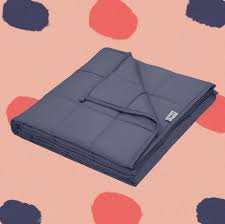How much do you know about weighted blankets? The theory is that a heavier than normal blanket hugs a sleeper, and may prevent tossing and turning. As a result, the sleeper feels more secure, and sleeps more soundly and for longer periods of time.
From easing the symptoms of autism spectrum disorder to helping insomniacs get the sleep he or she needs, weighted blankets may help address a host of health problems. This may help ease insomnia.
Until a person has experienced insomnia, it’s easy to dismiss it as a mere bump in an otherwise smooth road of easy sleep. It’s safe to say anyone with this attitude has never truly experienced insomnia. If you’re one of the 40 million Americans who suffer from the condition, you know exactly how Edward Norton’s character in Fight Club felt while he was so exhausted he literally hallucinated through the entire movie.
While your insomnia might not drive you to create an underground boxing club, it can definitely interfere with your life. Research has shown that a form of therapy called deep touch pressure stimulation promotes the release of serotonin, a chemical in our brains that helps promote sleep. Weighted blankets provide this firm but gentle pressure anytime a person needs it, thus, promoting sleep!
Not everyone who experiences bad sleep has insomnia. Sometimes fatigue is the result of poor sleep quality. While it is important to get the right amount of sleep, it is also important to make sure the sleep you get is truly restful and restorative. Many experts refer to this quality is sleep hygiene. The reader might wonder what is one way to improve my sleep hygiene.
One way to improve sleep hygiene is by using a weighted
blanket. Deep touch pressure stimulation boosts serotonin, meaning sleeping
under firm but gentle pressure can help you fall sleep faster, sleep longer,
and wake feeling more rested.
A weighted blanket helps with
sensory processing (SP) disorder. Researchers have described SP disorder as a
“traffic jam” in our brains. Information gets in, but it somehow gets
jumbled in clogged up along the way. This leads to anxiety and meltdowns.
Sensory processing disorder can especially be challenging for kids, who may not
always have the emotional maturity to verbalize his or her feelings.
Studies have shown that weighted blankets can lose a calming effect in kids and adults. The same research also states that weighted blankets help reduce anxiety that often accompanies these conditions.
A weighted blanket is a lot like getting a firm but gentle hug, except we don’t have to bribe someone for it. Even better, you can get benefits just being about anywhere, from your couch to your bed. Some people even use the weighted wraps in the office or car. Is there anything else that a weighted blanket can do?
A weighted blanket fights against stress. Stress happens to everyone, and is well known that chronic stress is a major problem our health. Whether it is a bad day at work, an argument with your spouse or an avalanche of bills, stress can do a number on your mental and physical health.
The great news is weighted blankets can help fight back. Research shows that deep touch pressure stimulation therapy works. With a weighted blanket, you don’t have to travel to the therapist or buying expensive equipment to get stress relief or weight.
When we are feeling depressed, it can sometimes seem like we will never feel normal or happy again. While it is normal to feel grouchy and irritable, researchers know that some bouts of sadness are caused by chemical changes in the brain. For example, if our brains are not producing enough serotonin, it could actually impact our emotional health.
Fortunately, deep touch pressure stimulation had been shown to the production of serotonin. There is also a link that deep touch pressure reduces cortisol (stress levels). Even better, we can get this therapy at home or just about anywhere with a weighted blanket or wrap. I’m sure we are all wondering what the medical community says about having a weighted blanket.
The medical science is just starting to weigh in. There is little data on the efficiency of weighted blankets. As Raj Dasgupta, assistant professor of clinical medicine at the University of Southern California any spokesman for the American Academy of Sleep Medicine told Washington Post it is tough to do a randomized double-blind trial on these products because they are weighted blankets. However, Dasgupta is open to the use of weighted blankets. He sees sleep as a puzzle made of all pieces including sound, light, temperature, and comfort; including restless sleepers and those dealing with insomnia need to figure out their missing pieces. For some, the answer may be white noise, blackout curtains, the perfect pillow, or blue light blockers. For others, it is the sensation of being hugged and cuddled that improves comfort. Dasgupta says,” I truly believe people with sleep issues do not want to be on description drugs for their lifetime. If a weighted blanket helps, I’m all for it!”
I personally use a 15 pound weighted blanket and I love it. I feel more secure in bed and wake recharged. However, a weighted blanket isn’t for everyone. Some people may feel claustrophobic or uncomfortable. Dasgupta says watching what we eat and drink and create good sleeping habits such as setting specific sleep-wait times and sticking to them can often help as much as external sleep aids. Even more important, put away the technology! He implores, “Don’t be under a weighted blanket looking at your smartphone.”

References
(SP)https://www.spdstar.org/basic/understanding-sensory-processing-disorder
Leave a Reply